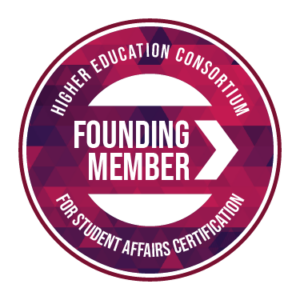
AFA as a Founding Partner of the Certified Student Affairs Educator (CSAEd) Certification
AFA is proud to be a lead partner in the development of the Student Affairs Educator Certification through the Higher Education Consortium for Student Affairs Certification. This consortium includes representation from each of the founding association partners, including NASPA, ACUHO-I, ACUI, NACA, ASCA, and NIRSA. In addition to the general certification, several specialty certifications are available, including a Fraternity/Sorority Life specialization (CSAEd-FSL).
Who is Certified? Click Here to Find Out!
About the Student Affairs Educator Certification
The Student Affairs Certification credentials were developed by subject matter expert practitioners and graduate faculty appointed by the Certification Consortium partner associations to benefit individual educators, institutions, professional associations, and the field. Learn more about the background and development of certification.
Student Affairs Educator Certification is a set of professional credentials designed for mid-level and above student affairs and services professionals to demonstrate knowledge in the field and a commitment to lifelong learning and ethical practice.
There have traditionally been limited means for educators to demonstrate their competencies and knowledge growth through ongoing work experience, and to then formally exhibit this growth in pursuit of lifelong learning and professional advancement. Certification offers a robust set of credentials to demonstrate this growth!
Benefits of Certification for Fraternity/Sorority Professionals
Student Affairs Certification has various benefits for individual professionals and their employing institution or organization. Below are just a few examples of how getting certified can benefit fraternity/sorority professionals.
- Demonstrates to various constituents (e.g. other departments, faculty, students, external partners), through an objective credentialing process, that you are a qualified and knowledgeable professional in the field
- Showcases depth of knowledge in the fraternity/sorority profession, regardless of institution type or headquarters affiliation
- Demonstrates commitment to the practice of student affairs and expands understanding of various topics throughout student affairs and higher education
- Provides guidance and accountability for ongoing learning and professional development plans
Learn More about Certification Benefits
Resources: Requesting Support from Your Organization
Eligibility Criteria
Participation in the CSAEd™ certification programs are voluntary and open to anyone meeting candidate eligibility requirements at the time of application.
Individuals applying for CSAEd™ core or a specialty certification must meet detailed education and work experience requirements at the time of application submission. All certifications require either a graduate/master’s-level degree and three years of full-time qualifying work experience or a bachelor’s or associate’s degree and four years of full-time qualifying work experience.
Qualifying employment experience defined as being employed full-time in student affairs or student services in a higher education setting (e.g., a fraternity/sorority inter/national headquarters).
Student Affairs Certification Eligibility Criteria
How to Apply
Applications for CSAEd™ certification open in cycles throughout the year. For more information about upcoming application cycle dates and deadlines, please visit the AFA Events page.

